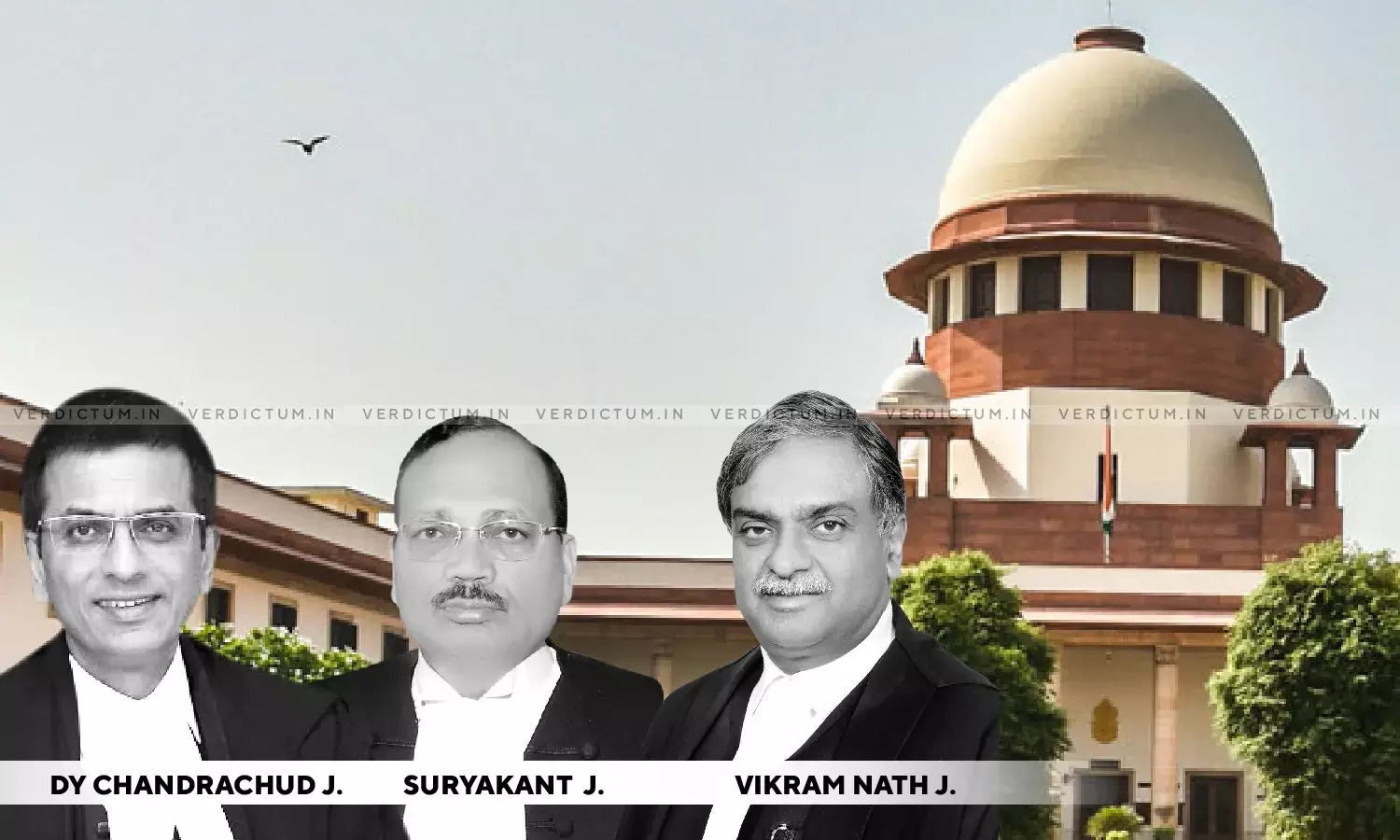Non-Signatory Can Be Bound By Arbitration Agreement On Basis Of Group Of Companies Doctrine – Supreme Court

A three-judge Bench of Justice DY Chandrachud, Justice Suryakant, and Justice Vikram Nath has held that a non-signatory can be bound by an arbitration agreement on the basis of the group of companies doctrine.
The Court relied on Chloro Controls India Pvt. Ltd. v. Severn Trent Water Purification Inc. & Ors, Cheran Properties Ltd. v. Kasturi & Sons Ltd. & Ors and MTNL v. Canara Bank & Ors. to clarify the applicability of the 'Group of Companies' Doctrine to the case in issue.
The Bench also held that the doctrine is applicable to a non-signatory by considering the following factors –
i) Mutual Intent of the parties;
ii) Relationship of a non-signatory to a party that is a signatory to the agreement;
iii) Commonality of subject matter;
iv) Composite nature of the transaction; and
v) Performance of a contract.
ASG Mr. K M Nataraj appeared for ONGC while Senior Counsel Mr. Shyam Divan appeared for JDIL before the Apex Court.
In this case, an appeal was preferred before the Supreme Court assailing the judgment of the Division Bench of the Bombay High Court which had dismissed an appeal filed under Section 37 of the Arbitration and Conciliation Act. ONGC had instituted an appeal against the interim award dated 27th October 2010 of the Arbitral Tribunal. The Tribunal had held that the second Respondent Jindal Drilling and Industries Limited (JDIL) was not a party to the arbitration agreement and must be deleted from the array of parties.
This interim award was challenged before the High Court by way of an appeal that was dismissed.
Aggrieved, ONGC approached the Supreme Court.
It is pertinent to note that the dispute had arisen between Oil and Natural Gas Corporation Limited (ONGC) and Discovery Enterprise Private Limited (DPEL) which was referred to arbitration.
It was contended by ONGC before the Apex Court that DPEL and JDIL constitute one single commercial entity and that ONGC was entitled by law to compel JDIL to participate in the arbitration proceedings so as to enforce the award against it.
Further, the ASG argued that the Arbitral Tribunal had merely held on the basis of legal principle underlying Section 7 of the 1996 Act and privity of contract, that JDIL which is not a signatory to the arbitration agreement cannot be impleaded in the arbitral proceedings.
It was also argued that the interim award did not consider or hear the application for discovery and inspection under Section 16. The decision was rendered purely on the basis that a non-signatory to the arbitration agreement cannot be impleaded as a party.
Thus, the group of companies' doctrine was applicable in this case, argued the ASG.
While the Respondent argued that the group of companies' doctrine could not be invoked to indict JDIL for the alleged acts and omissions of DPEL.
Group of Companies Doctrine - Applicability
The Bench while relying on various precedents noted –
"Commentators have noted that a signed written agreement to submit a present or future dispute to arbitration does not exclude the possibility of an arbitration agreement binding a third party. A non-signatory may be bound by the operation of the group of companies doctrine as well as by the operation of the principles of assignment, agency and succession. 23 A party, which is not a signatory to a contract containing an arbitration clause, may be bound by the agreement to arbitrate if it is an alter ego of a party which executed the agreement. This constitutes a departure from the ordinary principle of contract law that every company in a group of companies is a distinct legal entity. A non-signatory may be bound by the arbitration agreement where: (i) There exists a group of companies; and (ii) Parties have engaged in conduct or made statements indicating an intention to bind a non-signatory."
"In deciding whether a company within a group of companies which is not a signatory to arbitration agreement would nonetheless be bound by it, the law considers the following factors: (i) The mutual intent of the parties; (ii) The relationship of a non-signatory to a party which is a signatory to the agreement; (iii) The commonality of the subject matter; The composite nature of the transaction; and (v) The performance of the contract," the Bench opined.
The Court also held that consent and party autonomy are undergirded under Section 7 of the 1996 Act. However, a non-signatory may be held to be bound on a consensual theory, founded on agency and assignment, or on a non-consensual basis such as estoppel or alter ego.
The Bench also held that by failing to consider the application for discovery and inspection, the Tribunal has foreclosed itself from inquiring into whether there was sufficient material to establish the application of the group of companies doctrine.
In this context, the Court held –
"The application for discovery and inspection was indeed relevant to the exercise which was being carried out by the Tribunal."
The Court held that the interim award of the Arbitral Tribunal stands vitiated because –
"The failure of the arbitral tribunal to decide upon the application for discovery and inspection filed by ONGC; (ii) The failure of the arbitral tribunal to determine the legal foundation for the application of the group of companies doctrine; and (iii) The decision of the arbitral tribunal that it would decide upon the applications filed by ONGC only after the plea of jurisdiction was disposed of."
In the light of these observations, the Court set aside the impugned judgment of the High Court dismissing ONGC's appeal under Section 37 of the 1996 Act. The Court held that the plea by JDIL that Arbitral Tribunal lacks jurisdiction would have to be decided afresh and allowed the appeal.

